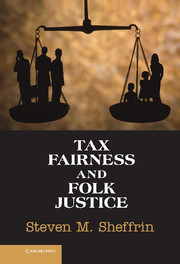Book contents
- Frontmatter
- Dedication
- Contents
- Preface
- Glossary of Terms in Psychology, Philosophy, and Economics
- 1 Approaching Tax Fairness
- 2 The Foundations of Folk Justice
- 3 Fairness and the Property Tax
- 4 Should We Redistribute Income through Taxation?
- 5 Why Do People Pay Taxes?
- 6 Desert, Equity Theory, and Taxation
- 7 Concluding Perspectives
- Bibliography
- Index
6 - Desert, Equity Theory, and Taxation
Published online by Cambridge University Press: 05 July 2013
- Frontmatter
- Dedication
- Contents
- Preface
- Glossary of Terms in Psychology, Philosophy, and Economics
- 1 Approaching Tax Fairness
- 2 The Foundations of Folk Justice
- 3 Fairness and the Property Tax
- 4 Should We Redistribute Income through Taxation?
- 5 Why Do People Pay Taxes?
- 6 Desert, Equity Theory, and Taxation
- 7 Concluding Perspectives
- Bibliography
- Index
Summary
“The harder you work, the luckier you get.”
Quote attributed to South African golfer Gary Player.Our folk justice principle of equity theory – outputs should correspond to inputs – is related to a concept in moral philosophy known as desert. According to desert theory, individuals deserve certain rewards through the actions they perform. Applying this idea to the market economy is controversial: do individuals deserve the market outcomes they receive?
This chapter investigates whether the theory of desert can contribute to our understanding of distributive justice and have practical implications for tax policy. The post-Rawlsian consensus has typically rejected this line of thinking in favor of either an approach to distributive justice based on a social contract, for example, as in Rawls’s Theory of Justice, or a utilitarian approach, as developed in the theory of optimal taxation. Both contractarian and utilitarian systems leave little room for desert in their accounts. However, other voices have emerged that question this seeming consensus. New experimental evidence raises the issue of whether individuals designing a social contract within the Rawlsian framework would, in fact, reject notions based on everyday notions of desert. In addition, a leading economist has recently suggested that our moral intuitions do not match the predictions of optimal tax theory and advances an alternative approach to tax policy based on desert.
- Type
- Chapter
- Information
- Tax Fairness and Folk Justice , pp. 191 - 214Publisher: Cambridge University PressPrint publication year: 2013

